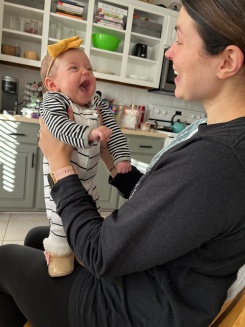Beethoven’s genes reveal low predisposition for beat synchronization
Craig Boerner
https://news.vumc.org/2024/03/26/beethovens-genes-reveal-low-predisposition-for-beat-synchronization/
Ludwig van Beethoven, one of the most celebrated musicians in human history, has a rather low genetic predisposition for beat synchronization, according to a Current Biology study co-authored by Vanderbilt University Medical Center (VUMC) and the Max Planck Institutes for Empirical Aesthetics in Frankfurt am Main, Germany, and for Psycholinguistics in Nijmegen, the Netherlands.
New Research: Singing to Your Baby Helps Their Speech and Language Development
Abby Barnes, M.S., CCC-SLP
https://www.expressable.com/learning-center/babies-and-toddlers/new-research-how-singing-to-your-baby-helps-their-speech-and-language
It’s a special feeling to hold your baby and look at them as they look back at you. You and your baby might do this as you rock in a rocking chair, make silly faces, or sing a nursery rhyme.
Study finds sensitivity to musical rhythm supports social development in infants
Craig Boerner
https://news.vumc.org/2022/11/03/study-finds-sensitivity-to-musical-rhythm-supports-social-development-in-infants/
Engaging infants with a song provides a readymade means for supporting social development and interaction, according to a study published in the Proceedings of the National Academy of Sciences.
Researchers at Vanderbilt University Medical Center, Marcus Autism Center, Children’s Healthcare of Atlanta, and Emory University School of Medicine enrolled 112 infants who were either 2 months or 6 months old.
FAQ about Beat synchronization GWAS study
Reyna Gordon
https://www.vumc.org/music-cognition-lab/FAQbeatGWAS
This page is an FAQ about Niarchou, Gustavson et al., 2022, Nature Human Behaviour. Genome-wide association study of musical beat synchronization demonstrates high polygenicity.
Access the full paper at https://doi.org/10.1038/s41562-022-01359-x

